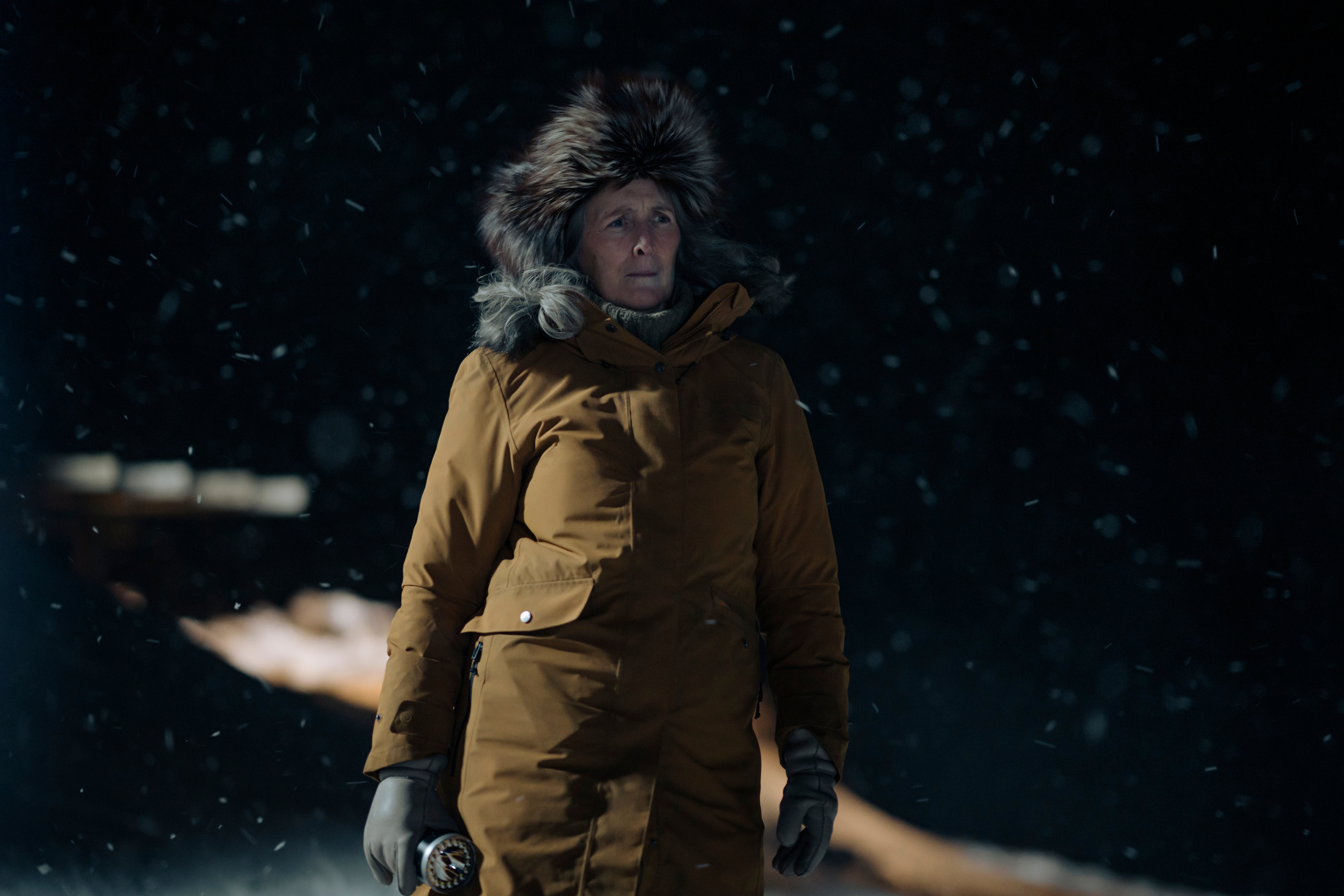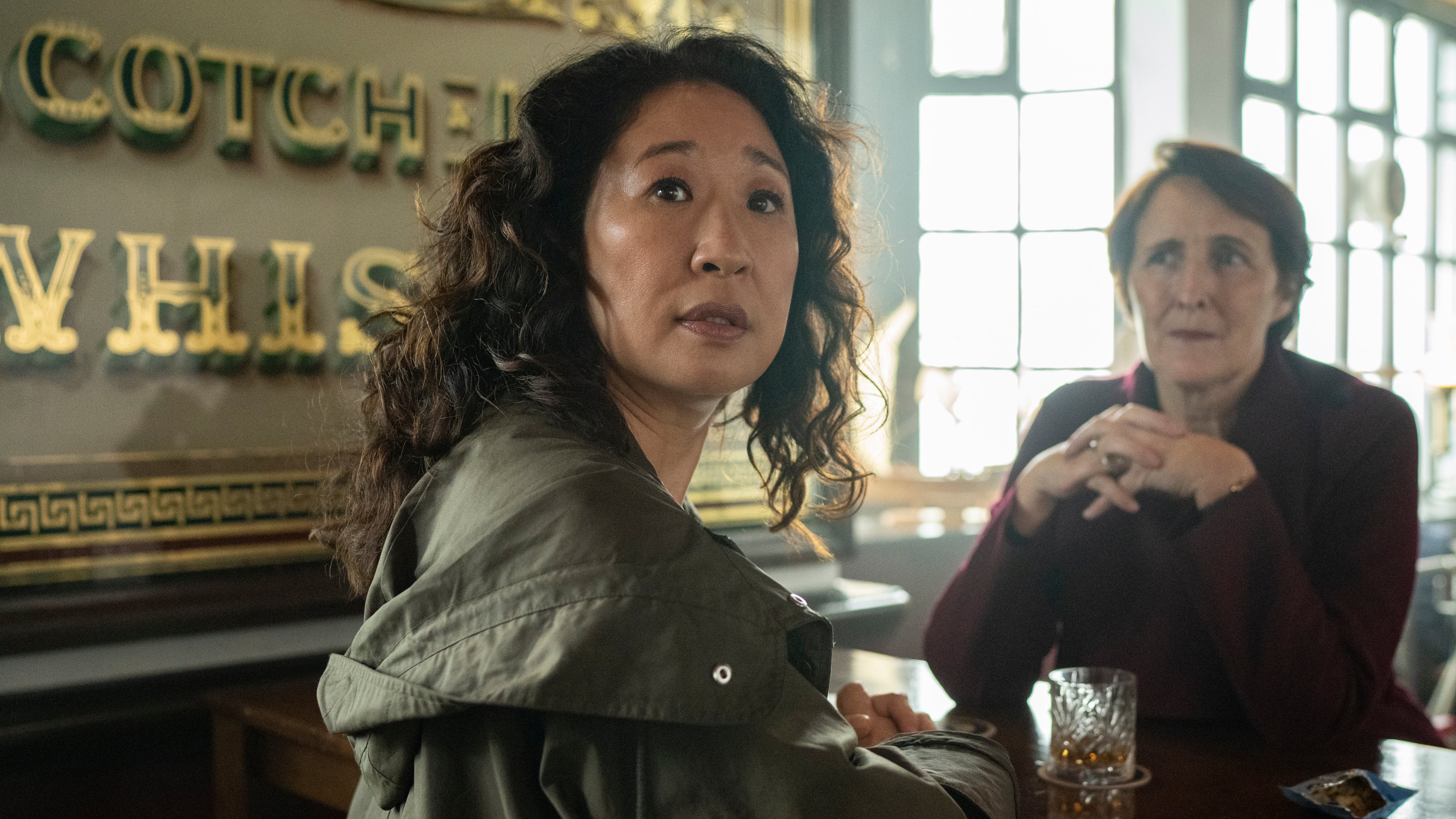
Just give me a moment.” Fiona Shaw pauses, and takes a deep, calming breath… before being plunged straight back into the topic she’s come to dread. The C-word.
“It’s hard to talk about Christmas so much, isn’t it?” she asks plaintively, in that subtle Irish brogue of hers. Many wrongly assume that the 66-year-old powerhouse actor is British, thanks to her penchant for playing characters with cut-glass English accents – stiff-upper-lip types in various guises, from chronically repressed Aunt Petunia in the Harry Potter franchise to frosty and unknowable MI5 agent Carolyn Martens in Killing Eve. Today, in the London hotel room where she’s set up camp for the day, the mere mention of Christmas has her smiling – albeit with a slightly manic, desperate air.
It’s hard to avoid the subject, of course – we’re here specifically to talk about her turn in Netflix’s animated film That Christmas. Written by Richard Curtis, whose first festive foray Love Actually came out 21 years ago, the 90-minute feature is adapted from his trilogy of children’s books and is seemingly the first ever Christmas film Shaw has been involved in. (Not that she can remember, mind you – “If you say so!” she concedes, when I attempt to double-check her extensive filmography.)
Amid a sea of seasonal hoopla, Shaw seems a beacon of understated elegance. While PR and marketing bods whizz around her in garish Christmas jumpers, and a fully decked-out Christmas tree is manoeuvred into the foyer outside, she sits perfectly poised in a simple yet expensive-looking cream silk shirt and charcoal trousers. And why shouldn’t she? This is a woman who’s more than paid her dues, with an illustrious stage and screen career spanning nearly 30 years (she’s one of those instantly recognisable veteran thesps who’s seemingly in everything).
But regardless of outfit choice, it can’t be helped; we have to talk about Christmas. Or That Christmas at the very least. Following the inhabitants of a small seaside town over the festive period, the family-friendly animation is genuinely sweet and charming. Shaw voices Miss Trapper, a fearsomely intimidating but ultimately misunderstood headteacher, heading up a stellar ensemble cast that includes Brian Cox, Jodie Whittaker, Lolly Adefope, Katherine Parkinson, Bill Nighy and Rhys Darby. Not that she got to work with any of them in the flesh. “I didn’t meet anybody!” she says; it was just Shaw alone in a sound booth, lending her voice to a project that was years in the making.
“That is really a tribute to the bonkers world we live in, where we turn millions of hours of people’s energy into an hour and a half of celluloid,” she says animatedly. “That’s become the new tulip, the new diamond… We turn so many people’s livelihoods into a [90-minute film] that people watch, and then say, ‘I think I’ll go and make a toasted sandwich now.’ It’s crazy!”
Shaw speaks a mile a minute, practically crackling with energy as she marvels at the insanity of modern media. “I suppose what creatives are doing is invading each other’s imaginations, aren’t we? A hundred years ago, you’d have been lying in a field, dreaming and looking at the sky. Now we get dreams kind of channelled into our brains, and we just hope that they’re good dreams. And I think that this – That Christmas – is a good dream.”

She instinctively does this – delves deeper, seeks out profound meaning, and applies curiosity and intellect to every topic as if it’s inherently worthy of ardent attention. It’s arguably this quality that makes Shaw such a nuanced actor, no matter the role, and has seen her consistently in work ever since her career kicked off post-drama school in 1983 with a starring role at the National Theatre.
“I think I’m in the most wonderful things,” she enthuses, citing her next couple of projects: series two of Sharon Horgan’s brilliant Apple TV series Bad Sisters; the upcoming film adaptation of the Deborah Levy novel Hot Milk. She feels less ownership over the Harry Potter films, remarking on the plans to remake them: “I don’t think anything about it! I don’t mind if they make 10 versions of it.”
Buzzy crime drama True Detective: Night Country, released on Sky Atlantic and Now TV earlier this year, was a particularly “astonishing” career highlight. To film her role of survivalist Rose Aguineau – mentor to detectives Liz Danvers (Jodie Foster) and Evangeline Navarro (Kali Reis) – Shaw was flown out to Iceland. “You wake up in the dark at 11am and then you go to work at 2pm, and it’s dark again, and you’re on night shoots that take you to 4am,” she recalls. “And you’re looking out the window at a few birds, but otherwise nothing lives there. There are no trees, and there’s just the sea, and you feel you’re at the beginning of the world.”
I’d got a bit fed up of my own acting
I find myself spellbound: Shaw weaves words together in such a way that the vision almost seems to hang, stark yet vivid, in the air between us. All of a sudden, she’s slapping herself on the wrist and moving on to the next thing: “I’m sorry! You haven’t asked me a question about that.” But she can’t help talking about the roles she’s most passionate about, it seems, the very next moment waxing lyrical about Killing Eve. The four-season smash hit ran from 2018 to 2022, and starred Sandra Oh and Jodie Comer as a spy and a contract killer caught in a sexually charged game of cat and mouse. Shaw, who played an inscrutable MI6 agent with murky allegiances, credits the show with helping her fall back in love with her profession.
“I’d got a bit fed up of acting, fed up of my own acting,” she tells me. “I began to wonder: have I had enough? Do I need a sabbatical?”

Before Killing Eve, Shaw had pivoted to directing operas while avoiding the stage herself. “You don’t know you’re taking a break,” she explains. “You just think, maybe I’ll pause for a minute and think about what I’ll do next. But you find years have gone by and you haven’t done any other plays.” Then along came Killing Eve and the role of Carolyn Martens. What did Shaw do to counteract that “fed up” feeling? Decided to completely change her acting style, of course.
“You can hear how garrulous I am in life,” she says, “so I decided to do the opposite of what I normally do, which is speak very fast. In Killing Eve I thought, just reverse it – and don’t speak.” She describes the process as a “revelation… you know, it’s like playing the piano differently. I just changed the way I hit the keys.”
This being Shaw, the choice didn’t just come out of nowhere – it was considered and rooted in research, which revealed that spies always choose their words very carefully “in case they blab the wrong thing”. The result was a character so intriguing that Shaw was not only included in all four seasons of the show, but became increasingly integral as the story progressed. By the end, the bilateral relationship between Eve and Villanelle had evolved into more of a triangle with Martens, a feature that contributed to the show’s success, posits Shaw. “There is that White Goddess thing in there: there’s the virgin who, in this case, was evil, which is interesting; there’s the matriarch, which is Eve; and there’s the Crone, which was me. There is a tripod of femaleness that works very well on a cultural, subconscious level.”

Femaleness dominated more than just the central characters of Killing Eve: every series was headed up by a different female writer. Phoebe Waller-Bridge, the show’s original creator and head writer on series one, was “sent from heaven”, says Shaw. “I’m very moved by Phoebe,” she adds, “because her delight in life and in wit, her real celebration of wit, is almost her raison d’etre. She reminds me of some aspect of myself when I was young. I think maybe a kind of madcap enthusiasm – I used to have that, and she has that.”
Ageing certainly has its advantages though. “I think your thirties and forties are very hard for women,” Shaw muses. “Your fifties and sixties are much easier. There’s something about landing… I suppose you stop trying to be Mozart, don’t you? You know you’re not going to write that symphony.”
In the acclaimed Star Wars spin-off Andor, she was given the opportunity to play two very different ages – both younger and older than herself – when portraying the protagonist’s mother, Maarva Andor, at different points in her life. The series, which follows Cassian Andor’s journey to rebellion as he becomes radicalised against the Galactic Empire, is, she says, an allegory for today’s political landscape. “The writing on that was spectacularly good and wonderfully stayed in the mythology of the universe – but actually, yes, it was entirely a mapping of what’s going on in our world.”
As Shaw said herself, she certainly is garrulous – we only have a matter of minutes remaining, yet somehow manage to delve into everything from the staggering number of Jane Austen screen adaptations (“my goodness, there’s a lot of them – it must be the tune of England or something”) to whether she ever feels like she’s competing with friends for parts (“Never! We’re not all meeting in some club every Friday going ‘Who got what? What are you playing?’”).

She’s particularly opinionated on the former topic: “I think there are about 1,000 other stories we could be telling ourselves, not least that of the empire. What was going on while Jane Austen was writing?” she asks. “People were being shot out of cannons in India by the British – why aren’t we telling that story? Famines were happening in Ireland – why aren’t we telling that story? On the edge of Austen was this other world of much more interesting people; they weren’t all sitting around on sofas going, ‘My hair!’”
And with that, we finally hit our limit. “Sorry we ran off into… you didn’t even ask me the questions!” Shaw laments. “I was off.” She still has just enough time to sneak in a mention of her next project – a mystery something involving Sacha Baron Cohen. This may be the one time she remains tight-lipped. “I can’t tell you anything about it, I’m just not allowed,” she says ruefully. It’s a shame. I feel fairly confident that she has some deep, profound thoughts on that too – if only she could share them.







